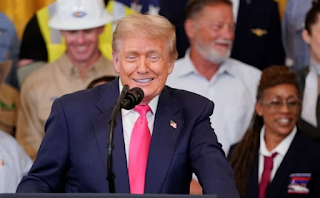Former US President Donald Trump’s recent remarks at the Big Beautiful Bill event have reignited speculation about a potential large-scale trade deal between the United States and India, following the formalization of a new trade agreement with China. Trump’s statement that “maybe with India, very big one… we’re going to open up India” signals renewed U.S. interest in deepening trade ties with one of its key strategic partners, particularly in light of escalating competition with China.
Key Takeaways from Trump's Statement:
-
Confirmation of a China Deal: Trump announced that the U.S. had just signed a new agreement with China. While vague in his speech, officials later confirmed the deal focuses on resuming rare earth mineral exports from China to the U.S.—a critical issue for American industries like defense, tech, and electric vehicles.
-
India Deal Hint: Trump teased the possibility of a “very big” trade deal with India, which he framed as a follow-up to the China agreement. He did not share specific details but emphasized the idea of “opening up India,” a likely reference to market access, tariff reduction, or regulatory harmonization.
-
Selective Deal-Making Philosophy: Trump made clear that his administration’s approach won’t be universal: “We’re not going to make deals with everybody… some will just pay 25, 35, 45 per cent.” This signals a strategy of targeted trade pacts with allies and economic partners, while applying tariff pressure on others.
China Deal – Rare Earth Breakthrough:
The White House later clarified that the agreement with China revolves around:
-
Resuming shipments of rare earths and critical minerals that had been held up by Chinese export restrictions.
-
Easing of U.S. export controls on certain Chinese imports, contingent on fulfillment of delivery commitments.
-
This rare earth deal aims to stabilize global supply chains, which had been significantly disrupted by the U.S.-China trade war and broader geopolitical tensions.
U.S. Commerce Secretary Howard Lutnick noted:
“They’re going to deliver rare earths to us… and once they do, we’ll take down our countermeasures.”
The agreement reportedly builds on progress made during the Geneva talks, which were previously stalled.
Progress on US-India Deal:
Earlier this month, at the US-India Strategic Partnership Forum, Lutnick indicated that the two sides were close to finalizing a trade agreement, saying:
“We’re in a very, very good place… and you should expect a deal in the not-too-distant future.”
He added that both countries had found a framework that “really works” for their respective economic and strategic interests.
Strategic Implications:
-
A trade pact with India would be geopolitically significant, further cementing ties amid a broader U.S. push to counterbalance China's influence in Asia.
-
It may cover tariff reductions, technology exchange, market access for U.S. agriculture and pharmaceuticals, and perhaps collaboration in critical supply chains like semiconductors and rare earths.
-
India has also been seeking greater access to U.S. tech and defense markets, and a finalized deal would support its efforts toward self-reliance and economic expansion.
Conclusion:
Trump’s comments, though light on specifics, suggest that an ambitious US-India trade deal is under active consideration—potentially one of the largest since the Indo-Pacific Economic Framework discussions began. If finalized, it would represent a major milestone in bilateral relations and a strategic shift toward greater economic integration between two of the world's largest democracies, at a time of heightened geopolitical realignment.



